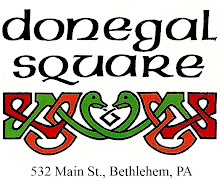Can you tell me any thing about the Lehigh Valley’s Celtic
heritage? I’ve been wondering just how Celtic we really are.
-LEHIGH VALLEY CELT
Dear LV Celt,
The Celtic heritage of our fair
Valley is well established, and I’m happy to let ye in on it.
The first settlers in the Lehigh
Valley were Irishmen from Northern Ireland (Ulster) an were of Scotch-Irish
descent, though, they considered themse’ves ta be Irish-givin Irish names to
many of the outlaying areas. They came to the New World ta escape the dredful
famines happ’in o’er there after the collapse of Ulster in the 1700’s.
Many of these brave souls settled
down in Philadelphia, while other searched for farm land to the west and north.
One of these roving bands, led by Colonel Thomas Craig, wandered north to the
Lehigh Valley in 1728. They settled on land between the Hokendauqua and
Monocacy Creeks, following the Catasauqua Creek south to the Lehigh river. The
settlement became known, rightly enough, as Craig’s Settlement or Irish
Settlement, and it was centered near Weavertown in Allen Township and extended
south in ta portions of Allentown, Bethlehem and Catasauqua.
Ho’ever, as in most good tales,
there was a catch. The land that they ultimately settled upon had been
guaranteed to the native Leni Lanape and Delaware Indian tribes by William
Penn, and after the infamous Walking Purchase of 1737, most of the Ulstermen’s
claims upon the land became illegal. The displaced natives raided and killed
many settlers, who of course retaliated in kind.
Then, wonderfully enough, in 1739,
William Allen (Royal Chief Justice of Pennsylvania and a creditor of the Penns)
was granted 1,345 acres of land east of the Lehigh and Hokendauqua Creek, which
he sold to the Irish settlers for a tidy sum. Allen also sold 400 acres to one
original Irish settler, Hugh Wilson, with the stipulation that he build a grist
mill. Wilson, along with Colonel Martin of Bethlehem, laid out the city plan
for Easton shortly after the Walking Purchase, probably at the request of John
and Thomas Penn, sons of William Penn.
Today, the Lehigh Valley’s Celtic
people remain a distinct group, whose heritage is celebrated each year at the
Celtic Classic! Hope that helps
ye.
For more information visit: http://www.portal.state.pa.us/portal/server.pt/community/things/4280/walking_purchase/478692
EDWIN




